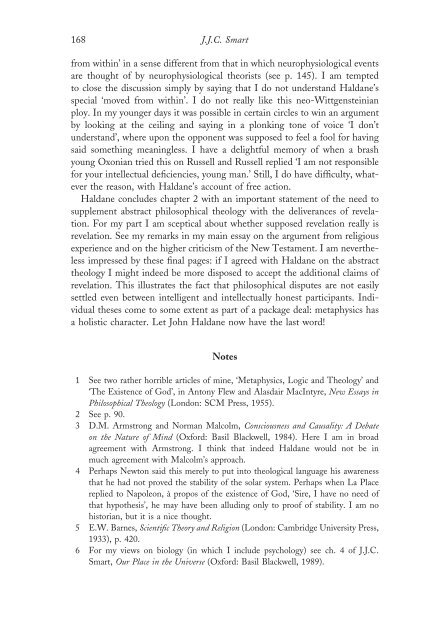Atheism and Theism JJ Haldane - Common Sense Atheism
Atheism and Theism JJ Haldane - Common Sense Atheism
Atheism and Theism JJ Haldane - Common Sense Atheism
Create successful ePaper yourself
Turn your PDF publications into a flip-book with our unique Google optimized e-Paper software.
168 J.J.C. Smart<br />
from within’ in a sense different from that in which neurophysiological events<br />
are thought of by neurophysiological theorists (see p. 145). I am tempted<br />
to close the discussion simply by saying that I do not underst<strong>and</strong> <strong>Haldane</strong>’s<br />
special ‘moved from within’. I do not really like this neo-Wittgensteinian<br />
ploy. In my younger days it was possible in certain circles to win an argument<br />
by looking at the ceiling <strong>and</strong> saying in a plonking tone of voice ‘I don’t<br />
underst<strong>and</strong>’, where upon the opponent was supposed to feel a fool for having<br />
said something meaningless. I have a delightful memory of when a brash<br />
young Oxonian tried this on Russell <strong>and</strong> Russell replied ‘I am not responsible<br />
for your intellectual deficiencies, young man.’ Still, I do have difficulty, whatever<br />
the reason, with <strong>Haldane</strong>’s account of free action.<br />
<strong>Haldane</strong> concludes chapter 2 with an important statement of the need to<br />
supplement abstract philosophical theology with the deliverances of revelation.<br />
For my part I am sceptical about whether supposed revelation really is<br />
revelation. See my remarks in my main essay on the argument from religious<br />
experience <strong>and</strong> on the higher criticism of the New Testament. I am nevertheless<br />
impressed by these final pages: if I agreed with <strong>Haldane</strong> on the abstract<br />
theology I might indeed be more disposed to accept the additional claims of<br />
revelation. This illustrates the fact that philosophical disputes are not easily<br />
settled even between intelligent <strong>and</strong> intellectually honest participants. Individual<br />
theses come to some extent as part of a package deal: metaphysics has<br />
a holistic character. Let John <strong>Haldane</strong> now have the last word!<br />
Notes<br />
1 See two rather horrible articles of mine, ‘Metaphysics, Logic <strong>and</strong> Theology’ <strong>and</strong><br />
‘The Existence of God’, in Antony Flew <strong>and</strong> Alasdair MacIntyre, New Essays in<br />
Philosophical Theology (London: SCM Press, 1955).<br />
2 See p. 90.<br />
3 D.M. Armstrong <strong>and</strong> Norman Malcolm, Consciousness <strong>and</strong> Causality: A Debate<br />
on the Nature of Mind (Oxford: Basil Blackwell, 1984). Here I am in broad<br />
agreement with Armstrong. I think that indeed <strong>Haldane</strong> would not be in<br />
much agreement with Malcolm’s approach.<br />
4 Perhaps Newton said this merely to put into theological language his awareness<br />
that he had not proved the stability of the solar system. Perhaps when La Place<br />
replied to Napoleon, à propos of the existence of God, ‘Sire, I have no need of<br />
that hypothesis’, he may have been alluding only to proof of stability. I am no<br />
historian, but it is a nice thought.<br />
5 E.W. Barnes, Scientific Theory <strong>and</strong> Religion (London: Cambridge University Press,<br />
1933), p. 420.<br />
6 For my views on biology (in which I include psychology) see ch. 4 of J.J.C.<br />
Smart, Our Place in the Universe (Oxford: Basil Blackwell, 1989).

















